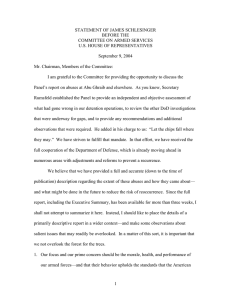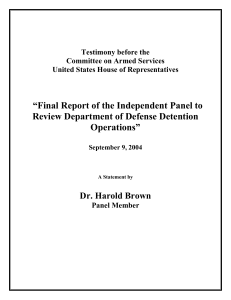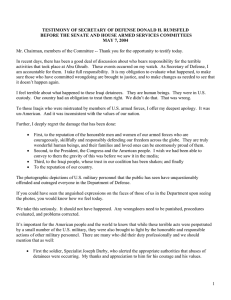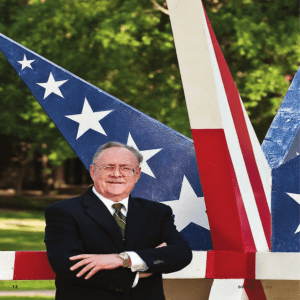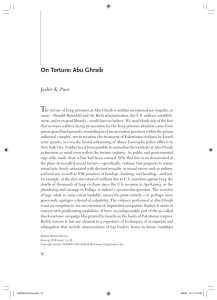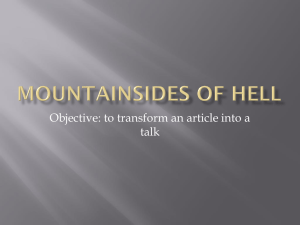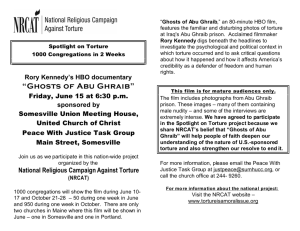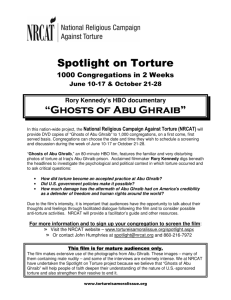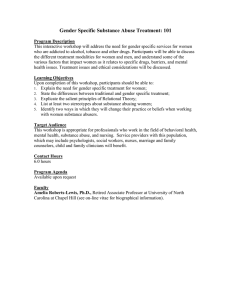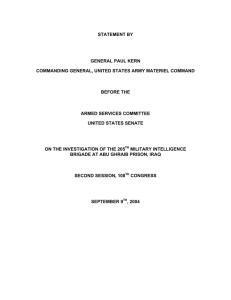Embargoed until September 9, 2004 STATEMENT OF JAMES SCHLESINGER BEFORE THE
advertisement
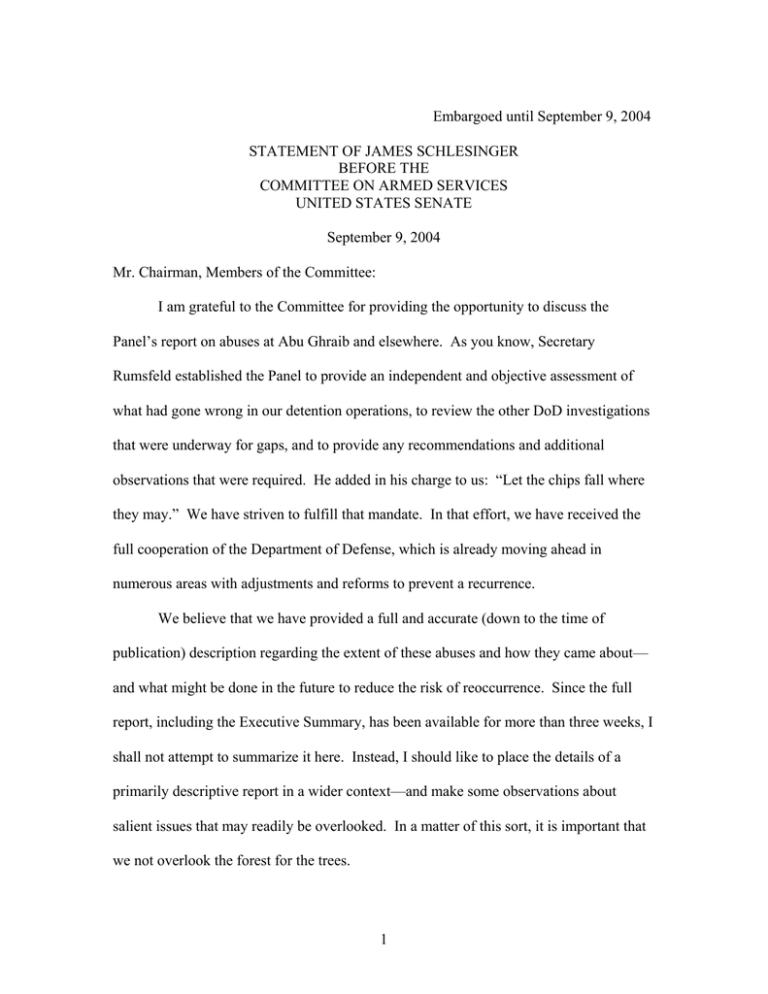
Embargoed until September 9, 2004 STATEMENT OF JAMES SCHLESINGER BEFORE THE COMMITTEE ON ARMED SERVICES UNITED STATES SENATE September 9, 2004 Mr. Chairman, Members of the Committee: I am grateful to the Committee for providing the opportunity to discuss the Panel’s report on abuses at Abu Ghraib and elsewhere. As you know, Secretary Rumsfeld established the Panel to provide an independent and objective assessment of what had gone wrong in our detention operations, to review the other DoD investigations that were underway for gaps, and to provide any recommendations and additional observations that were required. He added in his charge to us: “Let the chips fall where they may.” We have striven to fulfill that mandate. In that effort, we have received the full cooperation of the Department of Defense, which is already moving ahead in numerous areas with adjustments and reforms to prevent a recurrence. We believe that we have provided a full and accurate (down to the time of publication) description regarding the extent of these abuses and how they came about— and what might be done in the future to reduce the risk of reoccurrence. Since the full report, including the Executive Summary, has been available for more than three weeks, I shall not attempt to summarize it here. Instead, I should like to place the details of a primarily descriptive report in a wider context—and make some observations about salient issues that may readily be overlooked. In a matter of this sort, it is important that we not overlook the forest for the trees. 1 1. Our focus and our prime concern should be the morale, health, and performance of our armed forces—and that their behavior upholds the standards that the American society believes appropriate. If there are any defects, they must be diagnosed and any infected areas must be lanced and cauterized—as we seek to avoid repetition. In this manner, we can cleanse any stain on the reputation of our armed forces—so that their overall performance continues to be understood and highly valued by the larger society. 2. In this regard, we must continuously bear in mind that the overall performance of those armed forces has been commendable. We must not lose sight of that fundamental reality, which reflects both technology and a professional force. Through the advance of technology, we have been able to target enemy forces with precision. As a consequence, we sought in Iraq to preserve the infrastructure, so that it could serve Iraq’s future—and to successfully limit collateral damage. Moreover, we now have, by and large, a trained professional force. The vast majority of that force has behaved in Iraq with extraordinary forbearance—and including countless acts of kindness. In this respect, their performance has been vastly better than in previous wars—World War II, Korea, and Vietnam. While we did not feel it necessary to spell this out in the Report, in light of some of the public commentary, I can only say that it deserves emphasis and repetition. OUR TROOPS HAVE PERFORMED WELL. Bear in mind that we have had some fifty thousand detainees—and that over three hundred thousand of our troops have served in Iraq. To be sure, any abuses are too many. But, to date, we have identified some 300 cases of possible abuse of which fewer than 100 have been confirmed. One-third of those 2 abuses have been at the point of capture. War is a matter of violence, and, in combat, passions run high. 3. The Administration may have initially erred in characterizing the actions at Abu Ghraib as the result of a handful of MPs. Still in the overall performance, the 66 cases of confirmed abuse is a small number—comparing quite well, as I say, with previous wars. War remains a brutal business. Some critics reveal that they understand neither war nor history. We must not confuse the speed and extent of communication today with the extent of abuse—as compared to the past. 4. The Panel found no policy that encouraged or justified abuse—and more than a few actions to avoid abuse. To be sure, given the initial act of terrorism on 9/11 and the spurt in U.S. casualties in the summer of 2003, it was concluded that interrogation should be thorough and aggressive. In the war on terrorism, we would be naïve to limit ourselves to the traditional “name, rank, and serial number.” In the conditions of today, aggressive interrogation would seem essential. The injunction from the top was to insure “humane treatment” of detainees, even those who were judged outside the scope of Geneva protection. Admittedly, what constitutes “humane treatment” lies in the eye of the beholder. Some, including some in the Services, argued that aggressive interrogation went too far. That remains a matter of judgment. It also remains a far cry from a policy that encourages abuse. 5. These issues and the public reaction have been exacerbated by the photographs taken on the night shift at Abu Ghraib. Those photos constitute, to say the least, an idiosyncratic—and obviously unauthorized—activity by the night shift on Tier 1. The photographs are quite misleading. In contrast to the inferences that some initially 3 drew, those photographs had nothing to do with interrogation policy. NONE of the detainees abused in the photographs were targets of intelligence or of interrogation to gain intelligence. Nonetheless, abuses did occur at Abu Ghraib (and elsewhere) during interrogation. In such cases, the MPs had been encouraged by MI personnel to use aggressive tactics. Those excesses must be identified and corrected—to discourage any recurrence in the future. Such excesses may have resulted from confusion as to what was permissible. Some of that confusion may be understandable, since we had interrogation operations in three different places with varying rules. That created ambiguity. Nonetheless, in the future such ambiguity is unacceptable. A general policy should be designed—and enshrined in doctrine—so that military personnel are properly trained to observe appropriate rules. 6. Though abuses were indeed more widespread than observed on the night shift at Abu Ghraib; nonetheless, it is correct to characterize the situation on that night shift as having its unique aspects. Some have seized upon the photographs to suggest that torture was condoned. That is simply wrong. The actions of the night shift on Tier 1 were an aberration. The members were off on their own. As one participant admitted: “We did it for the fun of it.” I have characterized those activities by the night shift on Tier 1 as “animal house.” 7. In this connection, President Kennedy said, during the Cuban Missile Crisis, that a picture is worth a thousand words. It clearly is—if, and only if, you know what the picture means. But if pictures are misinterpreted, they can readily become a distorted mechanism. That can easily create an inaccurate impression—hiding, indeed 4 distorting, the overall performance, as I have suggested with respect to our armed forces in Iraq. Mr. Chairman, the Panel’s report delineated both errors of commission and errors of omission. But we found no indication of a policy encouraging abuse. To be sure, these abuses and the failed oversight that allowed them are an embarrassment. They do not reflect the standards that this society believes appropriate. We must take those step necessary to see that those standards are, indeed, upheld in the future. Yet, we must not allow some of the trees to obscure the view of the entire forest. These actions, by historical standards quite limited in number, are not representative of the overall behavior of our forces, which has been generally admirable. When sitting for his portrait, Oliver Cromwell ordered his portraitist, who wanted to pretty Cromwell up, that the portrait should include “warts and all.” Of necessity, our Panel was charged to concentrate on the warts. Yet, members of Congress must remain aware of the full portrait. In these somewhat personal remarks, I have tried to stress that a full portrait is more than those warts—which in our Panel we were obliged to analyze. Thank you very much, Mr. Chairman. I shall be happy to answer any questions that you or other members of the Committee may have. 5
